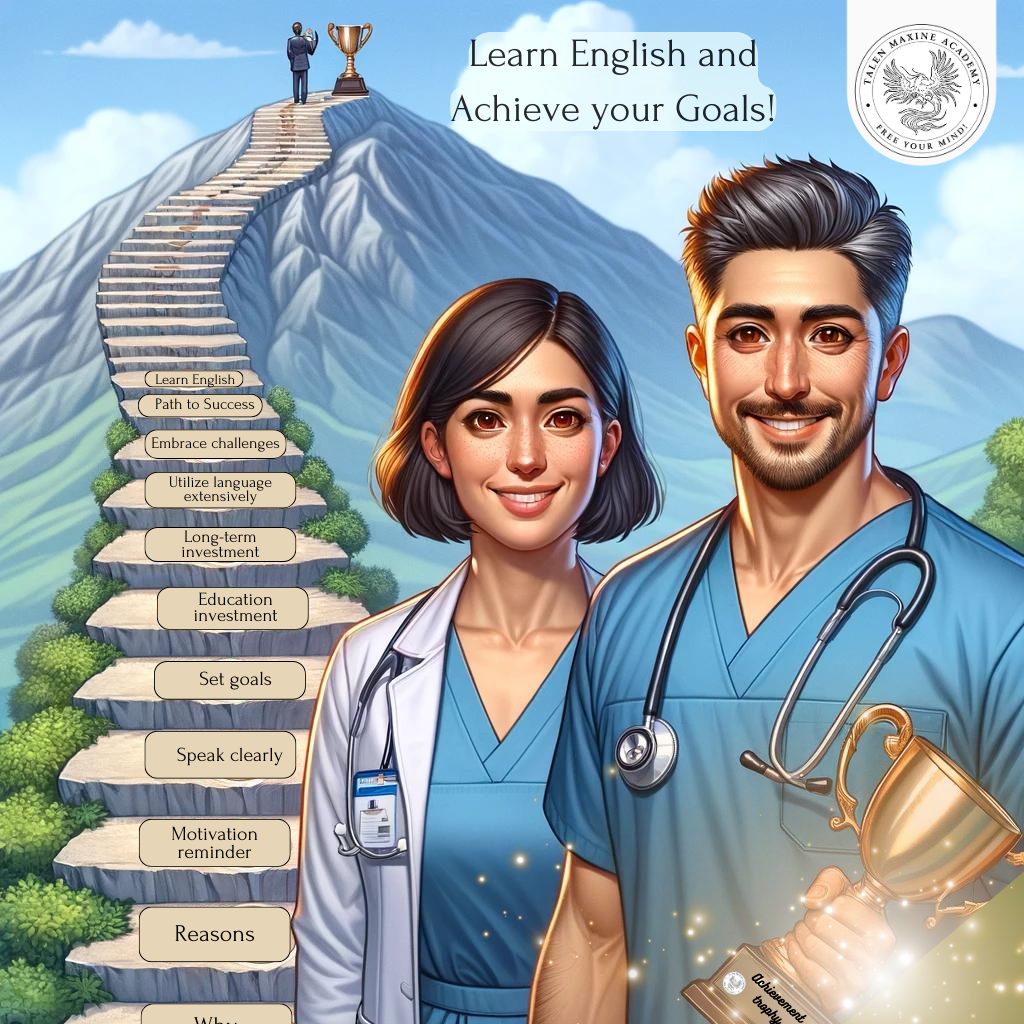Domina el Inglés con Palabras: Cómo un Vocabulario Abundante Transforma tu Aprendizaje y tu Éxito
🇪🇸 Domina el Inglés con Palabras: Cómo un Vocabulario Abundante Transforma tu Aprendizaje y tu Éxito
El dominio del inglés se ha convertido en una herramienta indispensable en el mundo moderno, no solo para comunicarnos a nivel global sino también para abrirnos puertas en el ámbito académico y profesional. En este contexto, aprender vocabulario es mucho más que memorizar palabras; es una llave maestra que desbloquea oportunidades y experiencias enriquecedoras. A continuación, exploraremos por qué un amplio vocabulario en inglés es crucial y cómo puede transformar tu manera de aprender y comunicarte.
1. Comunicación Efectiva: La Precisión en la Expresión
Poseer un amplio vocabulario en inglés no es simplemente una cuestión de cantidad, sino de calidad en la comunicación. Al tener a disposición una variedad de palabras, tienes la capacidad de expresar tus ideas y emociones con mayor precisión. Esto no solo facilita la transmisión de tus pensamientos sino que también enriquece tu capacidad de comprender a los demás. Nuestro «Programa de Desarrollo de Vocabulario«, con su enfoque en el aprendizaje holístico, potencia esta habilidad, permitiéndote absorber nuevas palabras, facilitando así una comprensión más profunda y personal del idioma.
2. Confianza: Tu Pasaporte para Hablar y Escribir con Solvencia
Al expandir tu vocabulario en inglés, incrementas automáticamente tu confianza para hablar y escribir. Este factor es crucial, especialmente en situaciones donde el inglés no es tu lengua materna. A través de técnicas de aprendizaje acelerado, como la repetición espaciada, puedes consolidar tu conocimiento de nuevas palabras, lo que se traduce en una mayor fluidez y seguridad al comunicarte.
3. Contexto Cultural: La Ventana a un Mundo de Expresiones
El inglés, como lengua global, es un reflejo de múltiples culturas. Comprender su vocabulario es también entender las expresiones idiomáticas y los matices culturales de los países de habla inglesa. Este conocimiento te permite no solo hablar el idioma sino también entender y apreciar la cultura y las costumbres detrás de las palabras.
4. Éxito Académico y Profesional: La Llave para Oportunidades Globales
En un mundo cada vez más interconectado, un buen dominio del vocabulario en inglés es esencial para sobresalir tanto en el ámbito académico como profesional. Especialmente en contextos internacionales, la capacidad de articular pensamientos complejos y entender terminología específica puede ser determinante para tu éxito.
5. Aprendizaje Continuo: Un Proceso en Constante Evolución
Finalmente, aprender vocabulario en inglés es un viaje sin fin. A medida que el idioma evoluciona, también lo hace la necesidad de actualizar y expandir tu conocimiento. Esta perspectiva de aprendizaje continuo no solo mejora tu habilidad lingüística sino que también mantiene tu mente activa y abierta a nuevos conceptos y culturas. Con nuestro «Programa de Desarrollo de Vocabulario» puedes seguir este camino de manera más natural y menos forzada, haciendo del aprendizaje un proceso placentero y en constante desarrollo.
Un vocabulario amplio y bien cultivado es mucho más que un conjunto de palabras; es una herramienta poderosa que abre puertas a la comunicación efectiva, la confianza personal, la comprensión cultural, el éxito académico y profesional, y un aprendizaje continuo y enriquecedor. Al integrar nuestro «Programa de Desarrollo de Vocabulario» en tu estudio del inglés, no solo aprendes un idioma, sino que también te empoderas para navegar y triunfar en un mundo globalizado.
🇺🇸 Mastering English with Words: How an Extensive Vocabulary Transforms Your Learning and Success
Mastering English has become an indispensable tool in the modern world, not only for global communication but also for opening doors in the academic and professional fields. In this context, learning vocabulary is much more than memorizing words; it is a master key that unlocks opportunities and enriching experiences. Next, we will explore why a broad vocabulary in English is crucial and how it can transform the way you learn and communicate.
1. Effective Communication: Precision in Expression
Having a wide vocabulary in English is not just a matter of quantity but of quality in communication. Having a variety of words at your disposal allows you to express your ideas and emotions with greater precision. This not only facilitates the transmission of your thoughts but also enriches your ability to understand others. Our «Vocabulary Development Program,» with its focus on holistic learning, enhances this skill, allowing you to absorb new words, thus facilitating a deeper and more personal understanding of the language.
2. Confidence: Your Passport to Speak and Write Fluently
By expanding your vocabulary in English, you automatically increase your confidence in speaking and writing. This factor is crucial, especially in situations where English is not your native language. Through accelerated learning techniques, such as spaced repetition, you can consolidate your knowledge of new words, which translates into greater fluency and security in communication.
3. Cultural Context: The Window to a World of Expressions
English, as a global language, is a reflection of multiple cultures. Understanding its vocabulary also means understanding idiomatic expressions and cultural nuances of English-speaking countries. This knowledge allows you not only to speak the language but also to understand and appreciate the culture and customs behind the words.
4. Academic and Professional Success: The Key to Global Opportunities
In an increasingly interconnected world, a good command of English vocabulary is essential for standing out in both the academic and professional fields. Especially in international contexts, the ability to articulate complex thoughts and understand specific terminology can be decisive for your success.
5. Continuous Learning: An Ever-Evolving Process
Finally, learning English vocabulary is an endless journey. As the language evolves, so does the need to update and expand your knowledge. This perspective of continuous learning not only improves your linguistic ability but also keeps your mind active and open to new concepts and cultures. With our «Vocabulary Development Program,» you can follow this path more naturally and less forcedly, making learning a pleasurable and constantly developing process.
A broad and well-cultivated vocabulary is much more than a set of words; it is a powerful tool that opens doors to effective communication, personal confidence, cultural understanding, academic and professional success, and continuous, enriching learning. By integrating our «Vocabulary Development Program» into your study of English, you are not just learning a language but also empowering yourself to navigate and succeed in a globalized world.
🗣️ ˈmæstɚɪŋ ˈɪŋɡlɪʃ wɪθ wɚdz: haʊ æn ɪkˈstɛnsɪv vəˈkæbyəˌlɛri trænsˈfɔrmz yɔr lɚnɪŋ ænd səkˈsɛs
ˈmæstɚɪŋ ˈɪŋɡlɪʃ hæz bɪˈkʌm æn ˌɪndɪˈspɛnsəbəl tul ɪn ðə ˈmɑdɚn wɚld, nɑt ˈoʊnli fɔr ˈɡloʊbəl kəˌmyunəˈkeɪʃən bʌt ˈɔlsoʊ fɔr ˈoʊpənɪŋ dɔrz ɪn ði ˌækəˈdɛmɪk ænd prəˈfɛʃənəl fildz. ɪn ðɪs ˈkɑntɛkst, ˈlɚnɪŋ vəˈkæbyəˌlɛri ɪz mʌtʃ mɔr ðæn ˈmɛməˌraɪzɪŋ wɚdz; ɪt ɪz ə ˈmæstɚ ki ðæt ʌnˈlɑks ˌɑpɚˈtunətiz ænd ɪnˈrɪtʃɪŋ ɪkˈspɪriənsɪz. nɛkst, wi wɪl ɪkˈsplɔr waɪ ə brɔd vəˈkæbyəˌlɛri ɪn ˈɪŋɡlɪʃ ɪz ˈkruʃəl ænd haʊ ɪt kæn trænsˈfɔrm ðə weɪ yu lɚn ænd kəˈmyunəˌkeɪt.
wʌn. ɪˈfɛktɪv kəˌmyunəˈkeɪʃən: prɪˈsɪʒən ɪn ɪkˈsprɛʃən
ˈhævɪŋ ə waɪd vəˈkæbyəˌlɛri ɪn ˈɪŋɡlɪʃ ɪz nɑt dʒʌst ə ˈmætɚ ʌv ˈkwɑntəti bʌt ʌv ˈkwɑləti ɪn kəˌmyunəˈkeɪʃən. ˈhævɪŋ ə vəˈraɪəti ʌv wɚdz æt yɔr dɪˈspoʊzəl əˈlaʊz yu tu ɪkˈsprɛs yɔr aɪˈdiəz ænd ɪˈmoʊʃənz wɪθ ˈɡreɪtɚ prɪˈsɪʒən. ðɪs nɑt ˈoʊnli fəˈsɪləˌteɪts ðə trænzˈmɪʃən ʌv yɔr θɔts bʌt ˈɔlsoʊ ɪnˈrɪtʃɪz yɔr əˈbɪləti tu ˌʌndɚˈstænd ˈʌðɚz. aʊɚ « vəˈkæbyəˌlɛri dɪˈvɛləpmənt ˈproʊɡræm ,» wɪθ ɪts ˈfoʊkəs ɑn hoʊˈlɪstɪk ˈlɚnɪŋ, ɪnˈhænsɪz ðɪs skɪl, əˈlaʊɪŋ yu tu əbˈzɔrb nu wɚdz, ðʌs fəˈsɪləˌteɪtɪŋ ə ˈdipɚ ænd mɔr ˈpɚsənəl ˌʌndɚˈstændɪŋ ʌv ðə ˈlæŋɡwɪdʒ.
tu. ˈkɑnfədəns: yɔr ˈpæspɔrt tu spik ænd raɪt ˈfluəntli
baɪ ɪkˈspændɪŋ yɔr vəˈkæbyəˌlɛri ɪn ˈɪŋɡlɪʃ, yu ˌɔtəˈmætɪkli ɪnˈkris yɔr ˈkɑnfədəns ɪn ˈspikɪŋ ænd ˈraɪtɪŋ. ðɪs ˈfæktɚ ɪz ˈkruʃəl, ɪˈspɛʃəli ɪn ˌsɪtʃuˈeɪʃənz wɛr ˈɪŋɡlɪʃ ɪz nɑt yɔr ˈneɪtɪv ˈlæŋɡwɪdʒ. θru əkˈsɛləˌreɪtɪd ˈlɚnɪŋ tɛkˈniks, sʌtʃ æz speɪst ˌrɛpəˈtɪʃən, yu kæn kənˈsɑləˌdeɪt yɔr ˈnɑlɪdʒ ʌv nu wɚdz, wɪtʃ ˌtrænzˈleɪts ˈɪntu ɡreɪtɚ ˈfluənsi ænd sɪˈkyʊrəti ɪn kəˌmyunəˈkeɪʃən.
θri. ˈkʌltʃərəl ˈkɑntɛkst: ðə ˈwɪndoʊ tu ə wɚld ʌv ɪkˈsprɛʃənz
ˈɪŋɡlɪʃ, æz ə ˈɡloʊbəl ˈlæŋɡwɪdʒ, ɪz ə rɪˈflɛkʃən ʌv ˈmʌltəpəl ˈkʌltʃɚz. ˌʌndɚˈstændɪŋ ɪts vəˈkæbyəˌlɛri ˈɔlsoʊ minz ˌʌndɚˈstændɪŋ ˌɪdiəˈmætɪk ɪkˈsprɛʃənz ænd ˈkʌltʃərəl ˈnuɑnsɪz ʌv ˈɪŋɡlɪʃ-ˈspikɪŋ ˈkʌntriz. ðɪs ˈnɑlɪdʒ əˈlaʊz
yu nɑt ˈoʊnli tu spik ðə ˈlæŋɡwɪdʒ bʌt ˈɔlsoʊ tu ˌʌndɚˈstænd ænd əˈpriʃiˌeɪt ðə ˈkʌltʃɚ ænd ˈkʌstəmz bɪˈhaɪnd ðə wɚdz.
fɔr. ˌækəˈdɛmɪk ænd prəˈfɛʃənəl səkˈsɛs: ðə ki tu ˈɡloʊbəl ˌɑpɚˈtunətiz
ɪn æn ɪnˈkrisɪŋli ˌɪntɚkəˈnɛktɪd wɚld, ə ɡʊd kəˈmænd ʌv ˈɪŋɡlɪʃ vəˈkæbyəˌlɛri ɪz ɪˈsɛnʃəl fɔr ˈstændɪŋ aʊt ɪn boʊθ ði ˌækəˈdɛmɪk ænd prəˈfɛʃənəl fildz. ɪˈspɛʃəli ɪn ˌɪntɚˈnæʃənəl ˈkɑntɛksts, ði əˈbɪləti tu ɑrˈtɪkyəlɪt kəmˈplɛks θɔts ænd ˌʌndɚˈstænd spɪˈsɪfɪk ˌtɚməˈnɑlədʒi kæn bi dɪˈsaɪsɪv fɔr yɔr səkˈsɛs.
faɪv. kənˈtɪnyuəs ˈlɚnɪŋ: æn ˈɛvɚ – ɪˈvɑlvɪŋ ˈprɑsɛs
ˈfaɪnl-i, ˈlɚnɪŋ ˈɪŋɡlɪʃ vəˈkæbyəˌlɛri ɪz æn ˈɛndlɪs ˈdʒɚni. æz ðə ˈlæŋɡwɪdʒ ɪˈvɑlvz, soʊ dʌz ðə nid tu ˌʌpˈdeɪt ænd ɪkˈspænd yɔr ˈnɑlɪdʒ. ðɪs pɚˈspɛktɪv ʌv kənˈtɪnyuəs ˈlɚnɪŋ nɑt ˈoʊnli ɪmˈpruvz yɔr lɪŋˈɡwɪstɪk əˈbɪləti bʌt ˈɔlsoʊ kips yɔr maɪnd ˈæktɪv ænd ˈoʊpən tu nu ˈkɑnsɛpts ænd ˈkʌltʃɚz. wɪθ aʊɚ « vəˈkæbyəˌlɛri dɪˈvɛləpmənt ˈproʊɡræm ,» yu kæn ˈfɑloʊ ðɪs pæθ mɔr ˈnætʃərəli ænd lɛs ˈfɔrstli,
ˈmeɪkɪŋ ˈlɚnɪŋ ə ˈplɛʒərəbəl ænd ˈkɑnstənt̚li dɪˈvɛləpɪŋ ˈprɑsɛs.
ə brɔd ænd wɛl – ˈkʌltəˌveɪtɪd vəˈkæbyəˌlɛri ɪz mʌtʃ mɔr ðæn ə sɛt ʌv wɚdz; ɪt ɪz ə ˈpaʊɚfəl tul ðæt ˈoʊpənz dɔrz tu ɪˈfɛktɪv kəˌmyunəˈkeɪʃən, ˈpɚsənəl ˈkɑnfədəns, ˈkʌltʃərəl ˌʌndɚˈstændɪŋ, ˌækəˈdɛmɪk ænd prəˈfɛʃənəl səkˈsɛs, ænd kənˈtɪnyuəs, ɪnˈrɪtʃɪŋ ˈlɚnɪŋ. baɪ ˈɪntəˌɡreɪtɪŋ aʊɚ « vəˈkæbyəˌlɛri dɪˈvɛləpmənt ˈproʊɡræm » ˈɪntu yɔr ˈstʌdi ʌv ˈɪŋɡlɪʃ, yu ɑr nɑt dʒʌst ˈlɚnɪŋ ə ˈlæŋɡwɪdʒ bʌt ˈɔlsoʊ ɪmˈpaʊɚɪŋ yɚˈsɛlf tu ˈnævəˌɡeɪt ænd səkˈsid ɪn ə ˈɡloʊbəˌlaizd wɚld.

Talen Maxine
Asesor Experto en el Aprendizaje de Idiomas
Expert Advisor in Language Learning










